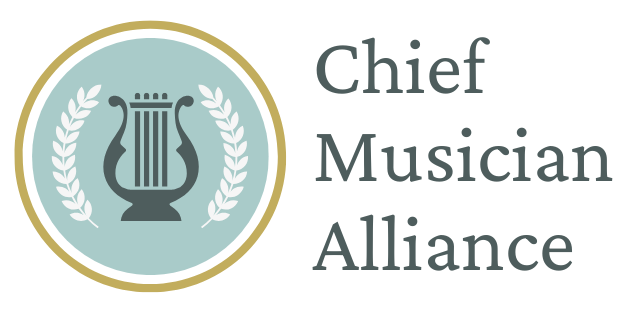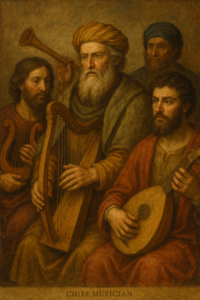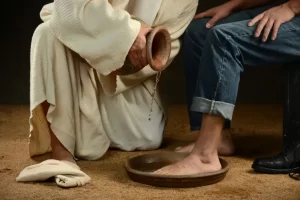The Asaph Creed
Preamble
This creed is a foundational statement born from the desire to articulate and uphold the core beliefs that shape our identity as ministers of sacred music.
In a world marked by a wide range of ministry philosophies and practices, the Asaph Creed provides clarity and unity rooted in the timeless truths of Scripture. It stands as a testament to our commitment to live out the faith we profess with intentionality, humility, and integrity.
Practically, this creed serves as a unifying standard for those entrusted with the leadership of music in the gathered church. It calls us to pursue biblical faithfulness over cultural trendiness, to prioritize congregational edification over personal expression, and to labor in harmony with our pastors and elders rather than apart from them. It helps churches recognize music ministries that are theologically sound and spiritually mature. It guides musicians toward a vision of worship that is God-centered, Word-saturated, and joyfully reverent.
In an age of shifting values and ministry models, the Asaph Creed offers a fixed standard. It grounds our work in Scripture, promotes theological alignment, and ensures that our music ministries serve the church with reverence, clarity, and fidelity to the gospel.
We, as Christian believers, unite under the banner of worship, guided by principles that shape our collective pursuit of divine communion and service of the body of Christ. With unity in heart and purpose, we affirm the following:
I. Congregational Singing:
We believe in the emphasis of congregational singing in our liturgies with a unified spirit, where voices blend in praise and adoration, offering to God that which resonates within our souls and reaches the heavens. The focus of singing in corporate worship is not on the musicians but on the assembly of God’s people lifting their voices to their Creator.
II. Simple Worship:
We embrace simplicity in worship, recognizing that true devotion lies not in grandeur or production, but in the sincere offering of our hearts, minds, and bodies to the Lord.
III. Elder Leadership:
We submit to the leadership of biblically qualified elders, who shepherd their flocks with wisdom, compassion, and unwavering commitment to the Word of God.
IV. Rooted in Ministry:
We are called to be a body of servants, where each member, equipped with unique gifts and talents, is empowered to serve one another with love, compassion, and grace.
V. Accountability of Musicians:
We uphold the accountability of musicians, knowing that leading sacred music requires integrity, humility, and a commitment to excellence in service to both the congregation and the Lord.
VI. Skillful Artistry:
We value skillful artistry as a means of glorifying God, recognizing that the pursuit of excellence in music and worship magnifies the beauty and effectiveness of our expression of faith.
VII. Theologically Robust Music:
We affirm the importance of theological depth and richness in our music, acknowledging that the words we sing and the melodies we embrace are vessels of truth, shaping our understanding of God and His redemptive work in the world.
VIII. Varied Stylistic Preference:
We embrace diversity and creativity in musical expression, rejecting rigid adherence to any particular stylistic tradition or form. Instead, we celebrate the beauty of variety and welcome the richness that different musical styles bring to our ministries.
IX. Generational Equity:
We commit to honoring our heritage by preserving and teaching the classic hymns handed down to us, recognizing their enduring value and significance in our worship tradition. At the same time, we acknowledge that God continues to inspire godly men and women to write hymns, and the songs written by our generation are vital contributions to worship on the Lord’s Day.
X. Faithful Stewards of God’s Provision:
We pledge to be faithful stewards of God’s provision, content with the volunteers, equipment, and funds that God has entrutsed us with for worship. We recognize that true worship does not require an abundance of resources, but a humble heart and a willing spirit to offer our worship unto the Lord.
In unity and humility, we pledge ourselves to live out these values, seeking to embody the spirit of worship in all aspects of our lives, and to extend the invitation of grace to all who seek to join us in our pursuit of advancing God’s Kingdom on earth.
Join the Alliance: Affirm the Creed
Join a growing network of ministry leaders who are committed to biblically faithful music ministries.
Add your name and ministry to the list of those who stand with us.
faq
The Asaph Creed exists to unite music ministry leaders around biblical convictions that shape how we serve the church in worship. It’s not a boundary marker of salvation or denominational identity, but a guide to help churches and musicians remain rooted in Scripture, faithful in practice, and clear in purpose.
We recognize that different churches and leaders may express things slightly differently. To affirm the creed is to agree with its core values and seek to lead a music ministry in line with its spirit and convictions. Unity doesn’t require uniformity, but it does require clarity and commitment.
No. The Chief Musician Alliance is a non-denominational initiative. The creed reflects broadly Reformed convictions and a high view of Scripture, but it is open to all leaders who seek to honor Christ and serve His church through biblically faithful music ministry.
Absolutely. While the creed is primarily aimed at those leading music ministries, we welcome anyone — from worship pastors to volunteer pianists — who embraces the values expressed and desires to grow in Christ-honoring service through music.
Churches can use the creed as a discipleship tool for their music teams, a theological alignment resource for staff, or a guide when evaluating songs and worship practices. It’s designed to build unity, provide clarity, and encourage thoughtful, biblically rooted ministry.
Once you affirm the creed, your name (if you choose) will be listed publicly as someone who shares these convictions. You’ll also be invited to join the broader work of the Chief Musician Alliance — including access to resources, blog content, and future collaboration opportunities.
The Asaph Creed is not a church constitution or confessional standard. It is a voluntary statement of shared convictions — meant to encourage, not police. Affirming it is an expression of alignment, not legalistic conformity.




